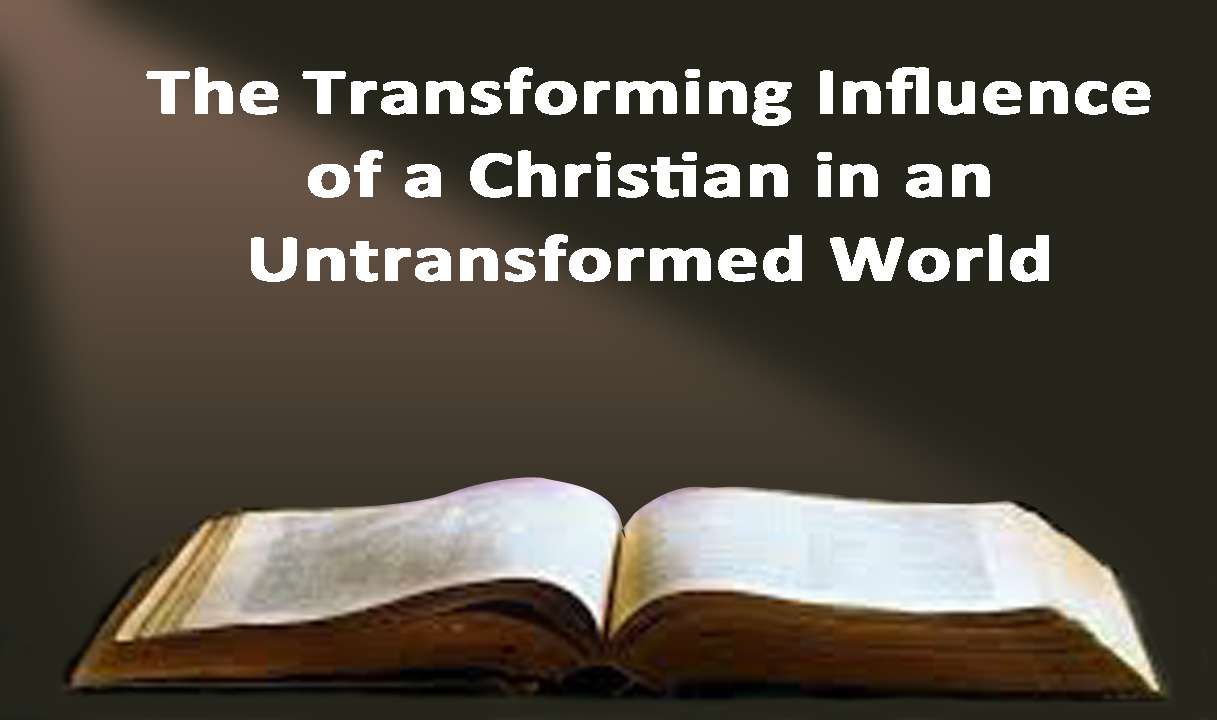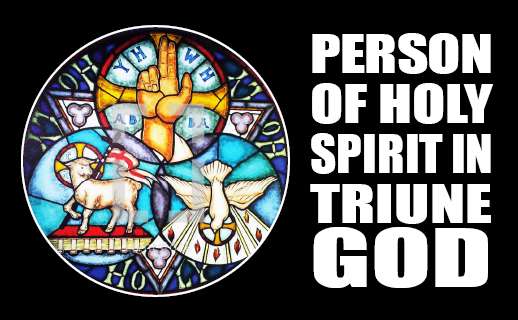

The Transforming Influence of a Christian in an Untransformed World
Dr. John Alex
The popular notion of influence is the ability of a person in winning the heart of others or a community. Dale Carnegie's famous book, How to Make Friends and Influence People is a bestseller in the West.
However most such books explain influencing others through a self-centred exaltation. In other words the mantra of that kind of influence is, we can influence through the power we exercise in the society. Is that the kind of influence Jesus intended? This article is a search for the alternative that Jesus said about the transforming influence of a Christian in the world. We can proceed further by looking into the general understanding of the meaning of influence.
What is influence ?
Influence simply means “the power to change or affect someone or something: the power to cause changes without directly forcing them to happen”. Some of the catch words of being an influence in the society is being authentic, increasing popularity and increasing your earning power and so on. In the social media, like Facebook or Twitter, when we have many followers or ‘like’ comments, it points to the influence we are producing in the society. Most of the secular books on influence explain different tips for winning people to our way of thinking. In a consumer oriented market the term influence is becoming popular.
Jesus highlights two imageries of influence in his famous teaching of Sermon on the Mount. “You are the salt of the earth” and “You are the light of the world.” These two imageries of influence are counter or opposite to the accepted understanding of influence. Jesus taught influence as identity dissolving than identity creation. Sermon on the Mount is the key for the Christian understanding of influence.
Sermon on the Mount: A Counter Influence
Sermon on the Mount is the Magna Carta for Christian influence in the society. It calls us for a Christian counter culture or influence. It means Christianity is not supposed to be influenced by the society but is called to be an influence in the society. John Stott writes: “The Sermon on the Mount is the most complete delineation anywhere in the New Testament of the Christian counter culture. Here is a Christian value system ethical standard, religious devotion, attitude to money, ambition, life-style and network of relationships – all of which are totally at variance with those of the non-Christian world.”
The influence Jesus taught is not a self developed influence but being transformed from the world and then be an influence. The influence Christians produce in the world is only the outer reality of our inner being. The key passage of the Sermon on the Mount is, 'Seek ye first the kingdom of God and its righteousness' (Matt. 6:33). The focus upon the kingdom of God brings forth the transformative change in a Christian to become the salt and light. When kingdom of God is not given the primary focus, it disappears. When the matter of kingdom of God is not first then it is not kingdom of God at all!
Do we really influence others? Jesus said “You are the salt of the earth.” The influence Jesus expected from Christians is by being true disciples. Jesus said, Salt is good; if salt has lost its taste how shall its saltiness be restored? It is fit neither for the land nor for the dunghill. (Luke 14:25, 26) The salt and light imageries has got a dual influence, one is negative and the other is affirmative. The negative influence is of arresting; the arresting of evil in the society. At the same time the imagery is affirmative by bringing light in the darkness.
The influence of salt and light is not bringing glory to themselves. Seeing the quality of both by the non-Christians, they will glorify the father in heaven. In other words, glorification of the father is the ultimate end of the influence of a Christian. Implications of these imageries in the context of consumerism and intolerance are highlighted below.
Consumerism and Influence
There are two contrary dangers in Christian life. One is asceticism and other is luxurious life-style. Asceticism renounces possessions whereas luxurious life style runs after greed. The Sermon on the Mount stands in contrast to both the approaches. Jesus neither calls us to follow asceticism nor luxurious life but to set everything in its proper place. True Christian influence is not running away from the world as an ascetic. Instead it is emphasised here that people should see our good works (Matt 5:16). The ‘salt and light’ imageries are not running away from the earth or the world. The imageries emphasise the fact that Christian life is not a retirement from the world instead being active in the world, producing the impact as a positive influence in the world.
In a consumerist society of laxity and excess, the Christian as the salt and light calls us to be a model of right living. Consumerism demands for aggressive passion for greed. Large numbers of people across society believe that they work merely to make a daily living. A close examination of their shopping lists will prove that they spend a good chunk of their income on ‘status symbol’ goods such as brand name clothing, the "right" kind of car, and other assorted items that they don't really need. Bible teaches contentment. The consumer society drives for many desires such as safety, security, money, power, prestige, excitement, sex, bigger house, better shoes, and a better stereo system and goes the list. These however will never constitute a good life.
The imageries of salt and light admonish the Christian to restrain from evil and encourage goodness. Consumerism demands for identity creation. But the imagery of salt stands opposite to it. Consumerism runs after brands and status quo whereas salt stands for identity dissolving. Salt and light basically give and expend themselves. It opposes every kind of self centred promotion. Consumerism calls for possessing things and control over it. The salt becomes salt and light becomes light only when they share its quality, failing which no one will recognise or understand it as salt and light.
Intolerance AndInfluence
Christians are called to be different. There are differences between a true Christian and non-Christians. The fundamental affirmation Jesus said is that the light differs from darkness. People should see the good works in us. In the previous passage of salt and light imageries, Jesus highlights ‘when you are persecuted, rejoice and be glad’ (Matt. 5:11-12). The reaction against persecution is not a counter attack but the path of tolerance.
The term “Intolerance” has become a major issue in the Indian political and religious scenario of 2015. The ghar vapasi (home return which means reconverting the converts to Hinduism) and other militant efforts of the Hindu religious fanatics has brought forth severe criticism. Pranab Mukerjee, the President of India several times raised the concern of intolerance in the Indian context within the last two years. Mukherjee comments on it: “the real dirt of India lies not on our street but in our minds ….”
In the world of hostility, Jesus’ teaching of ‘Blessed are peacemakers’ is revolutionary. Peacemaking is a divine work. It may appear strange that from peacemakers Jesus continues the teaching of persecution (Matt. 5:9-11). The Christians practice peacemaking through the Christian principle of love and forgiveness. These will bring mockery for a true Christian in the world. The principle of Ahimsa or non-violence by Gandhiji was adopted from Jesus’ teaching of Sermon on the Mount.
Jesus taught “Love your enemies and pray for those who persecute you.”(Matt. 5 :44) Jesus is asking to respond in heavenly ways to the world. Life of the redeemed community is based on the divine love which overcomes evil with good. The Christian call is not to imitate the world but to imitate the Father who is perfect. The queen will not bark back at the barking dog simply because she is queen.
Conclusion
Transformed to transform the world! Salt and light imageries highlight the fact that the ultimate aim of Christian influence is to glorify the father in heaven. The influence of a true Christian lies not in following the passions and fashions of the world. In a world of consumerism and intolerance, the Kingdom of God will be reflected in a true Christian through simple living and by overcoming evil with good.





